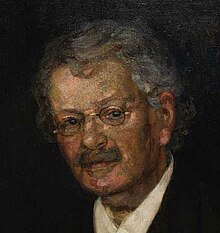Knut Wicksell
| Knut Wicksell | |
|---|---|
 |
|
| Born |
Johan Gustaf Knut Wicksell December 20, 1851 , Sweden |
| Died | May 3, 1926 (aged 74) , Sweden |
| Nationality | Swedish |
| Spouse(s) | Anna Bugge |
| Field | Political economics |
| School or tradition |
|
| Influences | Léon Walras, Eugen von Böhm-Bawerk, David Ricardo |
| Influenced | John Maynard Keynes, Friedrich von Hayek, Milton Friedman, Gunnar Myrdal, James M. Buchanan |
Johan Gustaf Knut Wicksell (December 20, 1851 – May 3, 1926) was a leading Swedish economist of the . His economic contributions would influence both the Keynesian and Austrian schools of economic thought. He was married to the noted feminist Anna Bugge.
Wicksell was born in Stockholm on December 20, 1851. His father was a relatively successful businessman and real estate broker. He lost both his parents at a relatively early age. His mother died when he was only six, and his father died when he was fifteen. His father's considerable estate allowed him to enroll at the University of Uppsala in 1869 to study mathematics and physics.
He received his first degree in two years, and he engaged in graduate studies until 1885, when he received his doctorate in mathematics. In 1887, Wicksell received a scholarship to study on the Continent, where he heard lectures by the economist Carl Menger in Vienna. In the following years, his interests began to shift toward the social sciences, particularly economics.
As a lecturer at Uppsala, Wicksell attracted attention because of his opinions about labour. At one lecture, he condemned drunkenness and prostitution as alienating, degrading, and impoverishing. Although he was sometimes identified as a socialist, his solution to the problem was decidedly Malthusian in advocating birth control, which he would defend to the end of his life. His fiery ideas had attracted some attention, but his first work in economics, Value, Capital and Rent (1892), went largely unnoticed. In 1896, he published Studies in the theory of Public Finance and applied the ideas of marginalism to progressive taxation, public goods and other aspects of public policy, attracting considerably more interest.
Wicksell married Anna Bugge in 1887. Economics in Sweden at the time was taught as part of the law school, and Wicksell was unable to gain a chair until he was awarded a law degree. Accordingly, he returned to the University of Uppsala where he completed the usual four-year law degree course in two years, and he became an associate professor at that university in 1899. The next year, he became a full professor at Lund University, where he would undertake his most influential work.
...
Wikipedia
